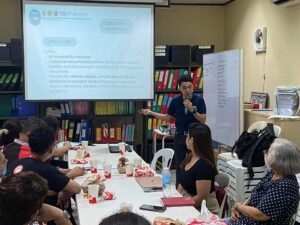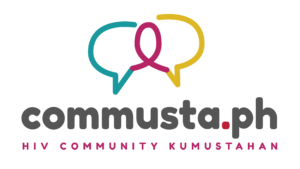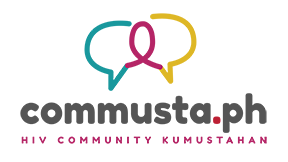Team Dugong Bughaw shared how CLM can be used by the community and LGUs in improving services
 Team Dugong Bughaw (TDB), a nonprofit organization that aims for a #healthierPH and a healthier Iloilo City by gathering Filipino youth to advocate for HIVawareness, shared their experience in localizing Community-Led Monitoring System (CLMS) and partnering with facilities and local government unit (LGU).
Team Dugong Bughaw (TDB), a nonprofit organization that aims for a #healthierPH and a healthier Iloilo City by gathering Filipino youth to advocate for HIVawareness, shared their experience in localizing Community-Led Monitoring System (CLMS) and partnering with facilities and local government unit (LGU).
To start establishing the CLM program in the locality, TDB conducted a dialogue with the heads of several healthcare facilities in Iloilo City, where it presented a background of the said project and introduced the roles of concerned government agencies and civil society organizations.
Team Dugong Bughaw is proud of their achievements in localizing the CLM as their partners were also able to effectively integrate the program into the service delivery process. It is also being discussed and introduced to clients who access Anti-retroviral (ARV) Treatment and other services in the facilities.
“yung partner facility, inaapply na rin nila ang importance of CLM when it comes to the performance of the facility.They are reminding the staff na kapag nandoon kami, let the people na pwede silang mainterview namin for the monitoring as well. And if next time na they are gonna visit, they can still use the feedback tool na kahit wala po kami. They can still continue answering.”, Kent Ganadillo, CLMS PH volunteer from the organization.
Through this program, TDB has established a collaborative relationship with the healthcare facilities of Iloilo City, especially Iloilo Social Hygiene Clinic and Western Visayas Medical Center. One of their action points was to meet quarterly to provide updates and discuss data results generated through the CLM System.
“Nung December, we had our first quarterly meeting.It was very successful in a sense na the facilities got to know na ito pala ‘yung CLM. At the same time, they were also able to suggest improvements on the way we presented the results. Dami nilang suggestions actually and we were very grateful that they were very involved and invested in CLM. Kasi nga, they are aware that it is for their own benefit as a facility.” , Tian, CLMS PH volunteer from the organization.
Team Dugong Bughaw and its partner facilities have used the CLM data to advocate for improvements in the services delivery.
“Most of the feedback that we got from the clients pertained to the infrastructure of the facilities so ‘yung results na ‘yun, it would support the clamour of the facility to ask from the higher-ups or the local governments. They have concrete proof that there’s a need for improvement in the facility,” Aldwin, CLMS PH volunteer from the organization
Concerns have also been raised regarding the facilities’ limited space, which allegedly puts clients’ privacy at risk. These reported issues, however, provided the Social Hygiene Clinic the basis to appeal from the Iloilo City LGU for appropriate solutions.
“Sa Western Visayas Medical Center, ‘yung feedback ng client is sobrang liit ng space kasi temporary space lang din ‘yun. Sobrang liit ng space at wala masyadong privacy. On a meeting with the head of HACT, they got the feedback and met with Western Visayas Medical Center and since may clear feedback from the client, ‘yung head ng WVMC has allotted a space in the hospital to transfer some services ng HACT so mas may privacy, mas conducive sa other services being availed.”
TBD shared that improving health service delivery at the local and national level would require the effort of the community as represented by both community-led organizaitons (CLOs)and the government.
“It’s the essence of feeling na you’re safe and secured na may ginagawang paraan kahit ‘yung government natin. Kasi ‘yung mga changes, mga improvements na ginagawa sa partner facilities namin dito, hindi siya magagawa ni Team Dugong Bughaw. Hindi namin kaya mag-provide ng building, hindi namin kaya mag-provide ng facility, as well as hindi rin kaya ng facilities na ‘yun na mag-provide on their own so we still rely on the government. And it is with us to share with the LGU partners and to bring it up to the higher offices.”


